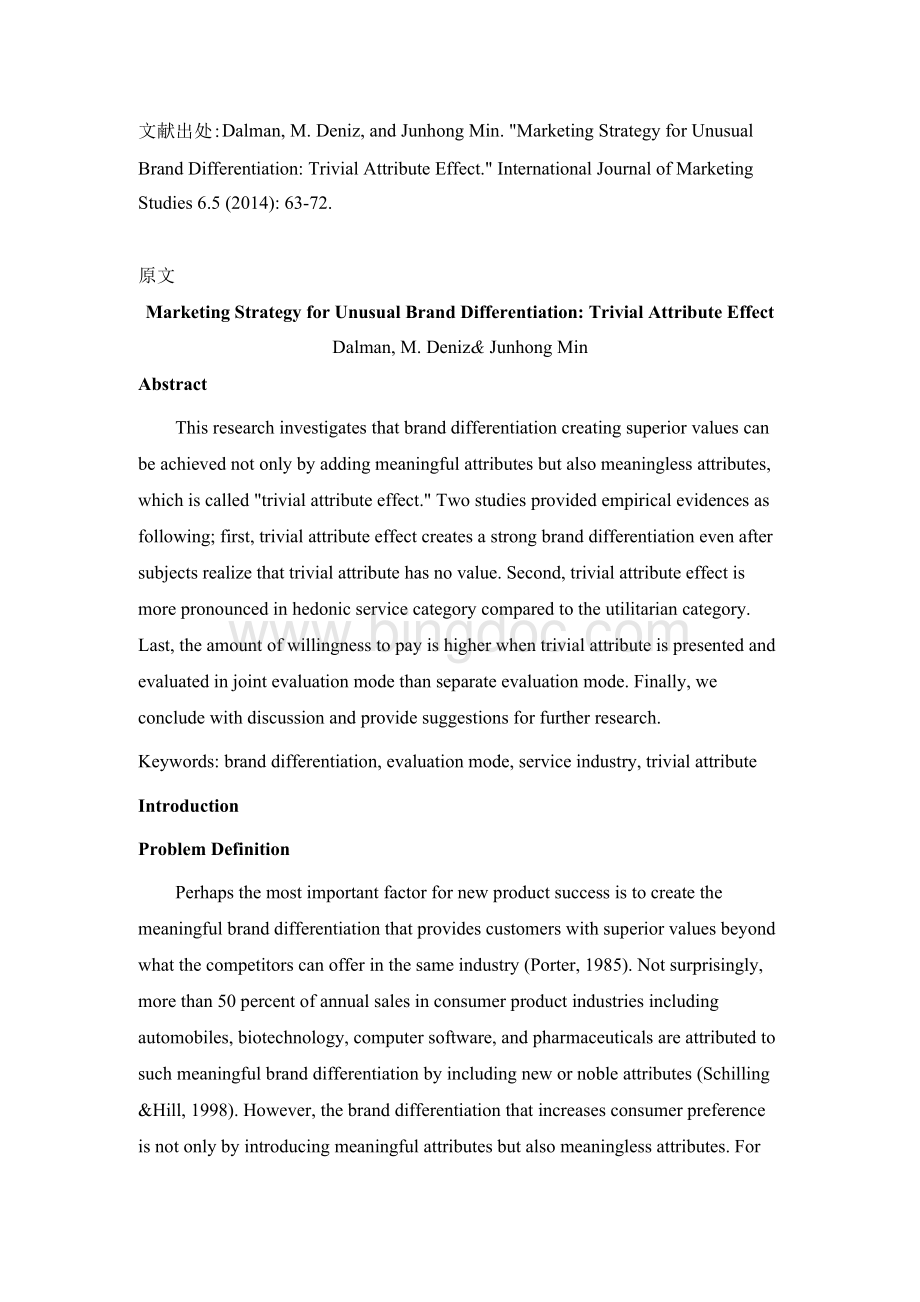差异化营销策略外文文献翻译Word格式.docx
《差异化营销策略外文文献翻译Word格式.docx》由会员分享,可在线阅读,更多相关《差异化营销策略外文文献翻译Word格式.docx(10页珍藏版)》请在冰点文库上搜索。

Dalman,M.Deniz&
JunhongMin
Abstract
Thisresearchinvestigatesthatbranddifferentiationcreatingsuperiorvaluescanbeachievednotonlybyaddingmeaningfulattributesbutalsomeaninglessattributes,whichiscalled"
trivialattributeeffect."
Twostudiesprovidedempiricalevidencesasfollowing;
first,trivialattributeeffectcreatesastrongbranddifferentiationevenaftersubjectsrealizethattrivialattributehasnovalue.Second,trivialattributeeffectismorepronouncedinhedonicservicecategorycomparedtotheutilitariancategory.Last,theamountofwillingnesstopayishigherwhentrivialattributeispresentedandevaluatedinjointevaluationmodethanseparateevaluationmode.Finally,weconcludewithdiscussionandprovidesuggestionsforfurtherresearch.
Keywords:
branddifferentiation,evaluationmode,serviceindustry,trivialattribute
IntroductionProblemDefinition
Perhapsthemostimportantfactorfornewproductsuccessistocreatethemeaningfulbranddifferentiationthatprovidescustomerswithsuperiorvaluesbeyondwhatthecompetitorscanofferinthesameindustry(Porter,1985).Notsurprisingly,morethan50percentofannualsalesinconsumerproductindustriesincludingautomobiles,biotechnology,computersoftware,andpharmaceuticalsareattributedtosuchmeaningfulbranddifferentiationbyincludingnewornobleattributes(Schilling&
Hill,1998).However,thebranddifferentiationthatincreasesconsumerpreferenceisnotonlybyintroducingmeaningfulattributesbutalsomeaninglessattributes.For
example,itisnotunusualtoseebrandsdifferentiatingthemselvesinthemarketplacebyaddingsomenon-importantattributestotheirofferings(e.g.,Coca-Cola'
s"
S"
shapebottle,PanteneshampoowithvitaminsorFolgerscoffeechangingtheshapeofcoffeeparticles).Thesenon-importantortrivialattributesasthemarketingliteraturesuggestsareattributesthat"
appearsvaluablebut,oncloserexamination,isirrelevantortrivialtocreatingtheimpliedbenefit"
(Carpenter,Glazer,&
Nakamoto,1994,p.339).
Inmarketing,thesuccessfulbranddifferentiationbytrivialattributeshasbeendiscussedandexplainedbythreedifferentresearchstreams.First,researchontrivialattributeshasshownthatofferingtheseattributesincreasebrands'
buyinglikelihoodbygivingconsumersreasonsorrationalforchoice(Brown&
Carpenter,2000).Interestingly,evenafterconsumersrealizedthatthebranddifferentiationbytrivialattributedidn'
tcreateanymeaningfuldifferentiation,theirbrandchoicewasthesame(Carpenteretal.,1994).Second,Miljkovic,Gong,andLehrke(2009)findthatthistrivialattributeeffectonbranddifferentiationdependsonthechoiceset.Specifically,theyfindthatwhenthechoicesetconsistsofatleastthreebrands-whereeachbrandisstrongoncertainattributesanditisdifficultforconsumerstomakeachoice,offeringatrivialattributeservesasa"
tie-breaker"
andthusincreasesthebuyinglikelihoodofthatbrand.Last,literaturerevealsthatbranddifferentiationcanbeobtainedbyhowcompetingbrandsarepresentedandevaluatedeitherseparatelyorjointlywhichiscalledthe"
evaluationmodeeffect."
Hsee,Loewenstein,Blount,andBazerman(1999)introducethetwotypesofevaluationmodes:
separateevaluationandjointevaluation.Separateevaluationdescribestheevaluationcontextinwhichbrandsareevaluatedoneatatime.Jointevaluationmeansthatthebrandsareevaluatedsimultaneously.Inparticular,jointevaluationincreasestransparencywhencompetingbrandsareevaluated(Chatterjee,Heath,&
Min,2009).Thus,whenabrandwithtrivialattributeispresentedandevaluatedjointlywithanotherbrandwithouttrivialattribute,consumersareeasytoidentifyuniquenessofthebrandwithtrivialattribute,whichresultsinbranddifferentiationandbrandpreference.Studiesintheevaluationmode
literaturecontinuetoprovidestrongempiricalevidencesthattheevaluationmodeeffectisparticularlystrongwhenconsumersneedtoevaluatebrandswithuncertainty(Chatterjeeetal.,2009;
Hseeetal.,1999).
ThePurposeofThisResearch
Althoughourknowledgeoftrivialattributeeffecthasbeengreatlyenhanced,howthetrivialattributeaffectsbrandevaluationhasneverbeenstudiedfromtheperspectiveofproductdevelopmentandmarketingstrategy.Ourresearchaimstofillthegapbyofferingempiricalevidencesfromtwostudies.Thegoalsofthispaperisfourthfolds;
1)Canbrandsincreasetheirchoicelikelihoodbyaddingsometrivialattributes,2)Doesthiseffectdependonthenatureofthecategory(i.e.hedonicvs.utilitarian),3)Doesthetypeoftrivialattributes(hedonicvs.utilitarian)affecttheconsumerresponsetothesetrivialattributes,andfinally4)Howcanmarketingmanagerseffectivelycommunicateabrandwithtrivialattribute?
Toreachthesegoals,inthefirststudy,wereviewtrivialattributeeffect,andtesthowitcreatesthebranddifferentiationinservicesector.Then,inthesecondstudy,wediscussabouttheevaluationmodeliterature,andtestthattheeffectwhethertrivialattributeismoresalientinjointevaluationorseparateevaluationmode.Finally,weconcludewithdiscussionandprovidesuggestionsforfurtherresearch.
TheoreticalBackground
TrivialAttributeEffectonServiceChoice
Trivialattributesaredefinedastheattributesthatdonotcreatemeaningfuldifferentiationinevaluationofalternatives(Broniarczyk&
Gershoff,2003;
Miljkovicetal.,2009).Consumerstreatthistrivialinformationintheadvantageofbrandsthatofferthemevenwhentheyareinformedbeforedecision-makingaboutthetriviality(Carpenteretal.,1994).BrownandCarpenter(2000)explainthisadvantagewiththereasonsbasedaccount.Theyarguethatconsumersprefertochooseonthebasisofeasilyjustified,cognitivelyavailablereasons(Brown&
Carpenter,2000).Thus,whentheoptionscannotbechosenbasedonimportantattributes,consumersneedtorelyon
trivialattributesthatcreatebranddifferentiation(Shafir,Simonson,&
Tversky,1993).
Thequestionaboutwhattoaddtotheofferingtoincreaseitsvalueisespeciallyimportantforservices(Devlin,1998),asitis moredifficulttocreateacompetitiveadvantageinserviceindustries(Storey&
Easingwood,1998).Themainreasonisthatunlikephysicalgoods,servicesareintangibleandconsumersoftenfaceaproblemofidentifyingthenecessaryattributesinservicesforevaluation.Thus,theyenduponlyrelyingonbrandcomparisonsonthebasisofselectedattributes(Gabott&
Hogg,1994;
Rust&
Chung,2006).Therefore,servicescreatemoreuncertaintyforconsumersthanphysicalgoodsatthepurchasestage.Whenadecisioncan'
tbejustifiedonrelevantattributes,consumersformargumentsbasedontrivialattributesevenaftertheyaretoldaboutthetrivialityoftheattribute(Albrecht,Neumann,Haber,&
Bauer,2011).
Therefore,withtheamountofuncertaintyinservicesandthedifficultyofevaluatingattributesasmentionedabove,consumersarelikelytousetrivialattributeswhentheyarefacedwithanambiguouschoicesetevenaftertheyaretoldaboutthetriviality.
Wepositthehypothesisasfollows;
H1:
Thechoicelikelihoodofserviceproviderthatoffersatrivialattributewillbehigherthanthatdoesnotoffer.
Comparedtophysicalgoods,servicesarebasedoninformationprocessing(Rust&
Chung,2006)andhowtheinformationisprocesseddependsonwhethertheserviceisutilitarianorhedonic(Hirschman&
Holbrook,1982).AccordingtoBatraandAhtola(1991),consumershavethesetwomotivesinachoicecontext.Hedonicservicesarerelatedto"
fun"
and"
pleasure"
(Babin,Darden,&
Griffin,1994)whereasutilitarianservicesarerelatedto"
functionality"
(Strahilevitz&
Myers,1998).Inachoicecontext,theoutcomesofthesetwotypesofservicesarevalueddifferentlyastheutilitarianoutcomedependsonobjectivestandardswhereashedoniconesdependonsubjective(discretionary)standards(Botti&
McGill,2010).Moreover,BottiandMcGill(2010)arguethathedonicmotivesaresought"
asanenditself"
whereasutilitarianmotivesareusedtoreachahigher-levelgoal.Wearguethatutilitarianservicesaremoreanxietyprovokingthanhedonicservicesastheyincludeimportant,
hardertoachieve,anduncertaingoals(Lazarus,1991).Andinsituations,whengoalsareanxietyprovoking,trivialattributesaremoreinfluential(Xiao,Dacin,&
Ashworth,2011).Therefore,weexpecttheeffectoftrivialattributestobemorepronouncedinahedonicservicecategorythaninautilitarianservicecategory.Wepositthehypothesisasfollows:
H2:
Theadvantageofserviceproviderthatoffersatrivialattributewillbemorepronouncedforthehedonicservicescomparedtoutilitarianservices.
MarketingCommunicationStrategyUsingTrivialAttributeEffect
Priorliteraturehassuggestedthatcomparisonisanaturalandpowerfulstrategythatconsumersoftenrelyon(Cooke,Janiszewski,CunhaJr,Nasco,&
DeWilde,2004;
Dhar,Nowlis,&
Sherman,1999).HseeandLeclerc(1998)suggestthatconsumerpreferencechangesdependingonhowproductsarepresentedandevaluated,specifically,whethertheyareevaluatedseparately(separateevaluationmode)orjointly(jointevaluationmode).Forexample,inseparateevaluationwhenoneisaskedtoratetheimportanceofsupportinggovernmentinterventionforsavingdolphinsoverpreventingskincanceramongfarmworks,thenumberofpe